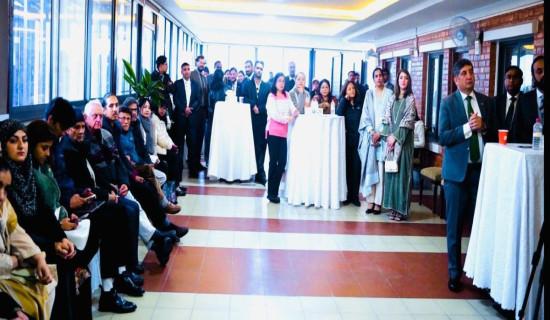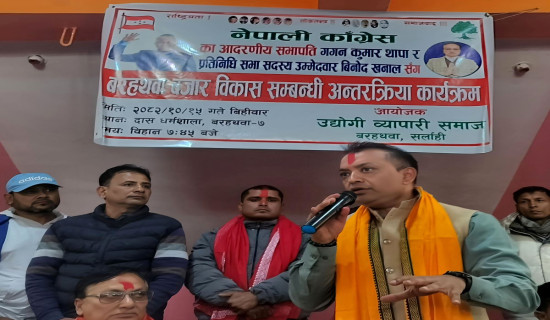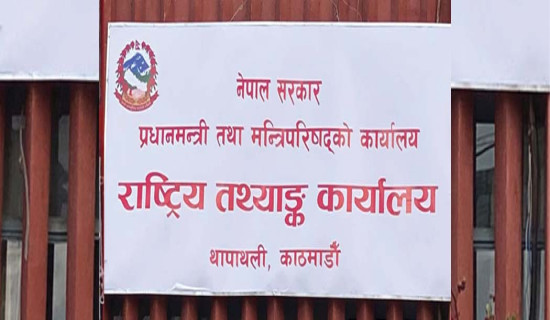- Friday, 30 January 2026
Sharma's Input In Innovative Ventures
A successful non-resident Nepali entrepreneur, Lok Raj Sharma, has made remarkable contributions to the economy of Nepal through innovative ventures in fintech, microfinance, and construction. He has created thousands of jobs and driven positive social change across the country and abroad with a work experience spanning over 20 years.
Born in the remote village of Sinja Valley in Jumla district, Sharma has achieved success because of his hard work and dedication while studying abroad. From an early age, Sharma was determined to make a difference. This talented man was, however, once unfit for the education system of Nepal.
Sharma came to Kathmandu to enroll in grade IX after passing the grade VIII examination in Jumla in 1999. But several public schools in Kathmandu denied admitting him, probably thinking that a student from remote Jumla would not fit in at the schools of the capital.
His parents were tired of trying to enroll in several schools. Finally, Shanti Shiksha School in Thahity, Kathmandu, agreed to admit him with a condition. After observing his hard work for three months, the school officially admitted him. A brilliant student, Sharma passed his diploma in civil engineering before flying to Greece for higher study in 2005.
He became the number one student at the International Business Academy (2008–2012) in Copenhagen, Denmark. Later, he passed a master's degree in international business management from a UK university and a diploma in leadership from Denmark.
His achievements have proven that it is not the place of birth that makes a person successful and contributes to society, but the determination, dedication, and honesty are the catalysts that make one successful in a future career. Currently, he is pursuing a PhD in Fintech Innovation from the Swiss School of Management, Italy.
Drawing from his diverse educational background and leadership training, Sharma has become a driving force in the fintech industry. Sharma has held significant leadership roles, including serving as a board member of Reewire International ApS and as the founder and chairman of GloHub ApS—both fintech companies operating in Denmark, Nepal, China, Singapore, Germany, and regions across South Asia and Africa.
In Nepal, he is the founder and CEO of Nepal Payment Solution Ltd., which collaborates with 90 per cent of the country's banks and financial institutions, becoming a central service and payment hub. Through Nepal Payment Solution, customers can transact at a minimum cost of around Rs. 1 per transaction, he said. This company is facilitating smoother, faster, and more reliable payment systems. His innovative decentralised settlement mechanism and aggregated payment platform are unique contributions to Nepal's digital economy.
These innovations have minimised the time, effort, and cost for small and medium-sized businesses looking to thrive in the digital space. With this innovation and business model, transaction costs have been reduced by up to 20 times, making digital payments significantly more affordable than ever before.
Sharma's ventures do not stop at fintech. He is also the founder and chairman of Matribhumi Laghubitta Bittiya Sanstha Ltd. and the chairman of Builder 360 Nepal, a print-house construction company.
MLBSL has a very successful history of the merger of seven microfinance institutions (namely, the then NRN Laghubitta, Kisan Microfinance, Dibya Laghubitta, Creative Laghubitta, Ramarosan Laghubitta, Jalpa Laghubitta, and Mahila Samudayik Laghubitta) within a short span of time, Sharma shares.
Currently, this institution has 250,000 members. Thousands of small entrepreneurs are receiving loans without any collateral. The company has provided loans exceeding Rs. 12 billion through its 250 branches across Nepal. Besides, more than 900 people are directly working in this institution.
The main objective of this institution is to provide financial services such as loans, deposits, microinsurance, and remittance services to low-income people, especially women. Apart from the financial services, the institution provides non-financial services like financial literacy training, skill development training, and entrepreneurship development training to its members. This institution is providing loans without collateral to youth to make them entrepreneurs, he said. This institution has not distributed dividends so far, he added.
"This organisation provides loans to individuals instead of groups to become entrepreneurs. This organisation provides loans charging only 15 per cent or less service fee," Sharma said. Under the Builder 360 Nepal, it has been constructing houses through the robots. "Our company is the first in Nepal to use robots in the construction works," he said. The company's use of robotics promises to significantly reduce construction time, improve precision, and lower costs.
Through this technology, the houses can be built within three months, and houses built through this technology can be relocated from one place to another. Sharma said that the company has been collecting wood in Karnali with the help of local people. Many people of Karnali are getting jobs and making good incomes by collecting wood and selling it to our company.
Besides, he is also a director of General Eco Tech (GET), the only e-waste recycling factory in Nepal, and a founder and director of Savagayan Pvt. Ltd., a leading EdTech company. GET is a 100 per cent export-oriented company with the best infrastructure to support all kinds of customer requirements.
According to him, GET is collecting scrapped mobile phones across the country, especially through sellers and collectors. "Various sellers, including Doko, collect scrap mobile phones, and eventually all of them will be sent to our company for recycling," he said.
By improving the recycling system and fostering community participation, the General Eco Tech Company is contributing to cleaner surroundings and healthier living conditions, playing a vital role in promoting responsible waste management. He said that all parts of the mobile phones will be reused.
Similarly, his company has been developing software as per the requirements of customers and also exporting software in the international market.
His company's software has reduced the need for software imports by banks and financial institutions, saving large amounts of money that would have been spent on imports.
Sharma's multiple IT companies employ thousands of software engineers. Through his entrepreneurial ventures, Sharma has also contributed significantly to social and economic transformation, creating over 2,000 direct employment opportunities in Nepal and abroad. His companies have not only contributed to economic development but have also positively impacted social change.
Sharma also plays an active role in promoting Nepali entrepreneurship on an international level, particularly in Scandinavia.
He currently serves as the chairperson of the Social Entrepreneurship Development Committee under the Non-Resident Nepali Association (NRNA). Additionally, he is the Founding President of Ropni Youth Club, Jumla, Nepal, further solidifying his commitment to social change and development.
Through his inspiring journey, Sharma has transformed not only businesses and economies but has also touched lives on a personal level. His leadership extends to social service, as he works on projects that drive mobility and development for underserved communities.
According to Sharma, if young people work hard at home and abroad, they can gain recognition on both national and international levels. He added, "If youth go abroad and work honestly, they can contribute to their motherland by using their skills, knowledge, and capital in the future."
(The author is a journalist at The Rising Nepal.)

















